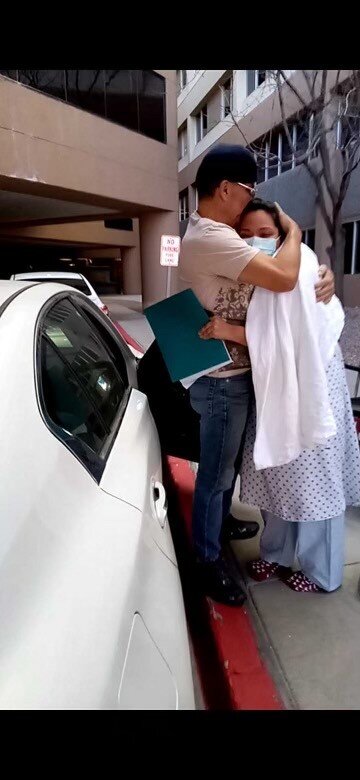Pueblo 20-year-old was 'close to dying' after strokes linked to COVID-19

PUEBLO, Colo. — 2020 was a year of new beginnings for Jalyn Tenorio.
It was the year the 20-year-old moved out on her own, leaving her hometown of La Junta, Colorado for Pueblo to find new job opportunities.
But as the year came to a close, a health crisis nearly ended her life.
Tenorio says she is recovering after suffering multiple strokes linked to COVID-19 around Christmas time.
“I had no idea this would happen,” Tenorio told Rocky Mountain PBS.
“Jalyn is the youngest stroke patient associated with COVID that I have seen so far,” said Dr. Elizabeth Macri, a neurologist who treated Tenorio at the University of New Mexico Hospital.
Jalyn has only a few memories of what happened. She says she was working her job at the Target distribution center in Pueblo when she started feeling nauseous. She says a supervisor sent her home and advised her to get tested for COVID-19.

“I left because I needed to throw up. I got home and I felt really, really tired,” Tenorio said.
Tenorio said she did not experience respiratory symptoms associated with COVID-19. The day after she became ill at work, she says she felt better and seemed to be improving so she and her boyfriend drove to New Mexico to visit his family.
After they arrived, her condition took a turn for the worse. She remembers little of what happened next, except that she felt dizzy and very tired.
“My boyfriend and his mom, they realized something was off and they were like, ‘She needs to go to the ER,’” Tenorio said.
Tenorio tested positive for COVID-19 at the hospital. Doctors saw she had weakness on one side of her body and discovered a clot in a vein in her brain.
“Because it hit a deep area of her brain that allows you to stay awake, she got very sleepy, because that part wasn't working anymore,” Dr. Macri explained.
Dr. Macri said there is an increased association between COVID-19 and blood clots.
“One of the most important things that we can learn from this is that even though younger patients are less likely to die or have significant side effects from COVID, they are still at risk, even if they don't feel like they have COVID,” Dr. Macri said.
Tenorio spent more than two weeks in the hospital without visitors as she recovered from the COVID-related stroke, which affected her ability to speak and walk.
“What Jalyn went through was definitely potentially life-threatening,” said Dr. Macri. “She had swelling deep inside her brain, and that would have continued to worsen if she hadn't come to the hospital. She could have slipped into a coma and potentially she could have passed away from that.”
Tenorio is not sure exactly where she contracted COVID-19. She says she wore masks regularly and followed health guidelines at work. She wants people her age to realize they are also at risk during the pandemic.
The Target distribution center where Tenorio works has an active outbreak with at least 57 cases among employees dating back to October, according to state data.
In a statement, a Target spokesperson said the company has implemented many enterprise-wide measures to ensure a safe and clean working environment for its teams. The spokesperson said the Pueblo distribution center had less than 10 cases of coronavirus in January and staff are working closely with local health officials.
Employees like Tenorio who test positive receive 14 days of paid leave, and a spokesperson said team members are notified when cases of coronavirus are confirmed among coworkers. Those who are determined to have had close contact with an infected colleague also receive paid quarantine leave.
Tenorio says she is hoping to return to work soon, but needs therapy to regain strength in her arm affected by the stroke. She says now she worries about contracting COVID-19 again and prefers to stay at home.
She says the health crisis made her consider going back to college to pursue her goal of becoming an emergency medical technician.
“I didn't know that I was really close to dying," she said. "When they told me that, it made me open my eyes that this life, there's a lot more to it. And I need to live every bit of it."
